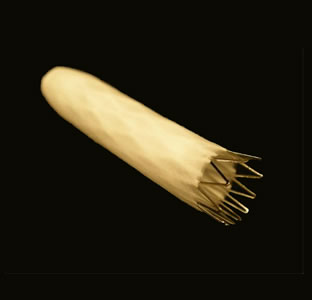UTSA alumna, advisers launch Cardiovate to prevent aortic aneurysm ruptures

Cardiovate device

Cardiovate device
(May 23, 2012) ---University of Texas at San Antonio (UTSA) alumna Jordan Kaufmann, Ph.D.; UTSA College of Engineering Dean Mauli Agrawal; and UT Medicine San Antonio cardiologist Steven Bailey, M.D., have launched Cardiovate, a technology start-up that will offer a new and much-needed cardiovascular stent-graft to prevent aneurysm leakage following cardiovascular surgeries.
Kaufmann, an alumna of the UTSA College of Engineering's Department of Biomedical Engineering, developed the stent-graft as part of her doctoral research with UTSA's Agrawal and Bailey, division chief for cardiology in the School of Medicine of the UT Health Science Center San Antonio.
"To take an idea that we were throwing around and develop it all the way to a product for a start-up company has been an incredible opportunity," said Kaufmann. "The path epitomized both translational research and multidisciplinary studies, which has been a great educational experience."
Approximately 1.2 million people in the United States suffer from an abdominal aortic aneurysm. Aneurysm rupture is the nation's 13th leading cause of death. Surgeons perform approximately 65,000 abdominal aortic aneurysm repairs annually.
However, in a surgical repair procedure called endovascular aneurysm repair, one of every six patients experiences stent-graft leakage from traditional stent-grafts in the month following surgery. Additionally, 20 to 30 percent of patients require additional corrective surgery as much as six to eight years later.
While pursuing her doctoral degree in biomedical engineering at UTSA under the supervision of Agrawal and Bailey, Kaufmann developed a unique scaffold, which promotes tissue formation. The product, called a tissue-engineering scaffold for aneurysm repair (TESAR), creates a tissue barrier between the blood and the aneurysm after it is implanted.
The scaffold promotes healthy tissue formation to repave the aneurysm wall. Once the scaffold is in place, the aneurysm stops expanding and the risk of rupture decreases. After new tissue is in place, the scaffold degrades and is safely reabsorbed by the body.
Cardiovate's TESAR stent-graft has been shown in the laboratory to reduce post-operative complications during aneurysm repair surgery such as the need for additional corrective surgeries following the initial procedure. Also, the natural tissue is a better match for biological healing than the materials found in traditional stent-grafts.
Between now and March 2013, Kaufmann, Agrawal and Bailey will work together to refine the manufacturing of the TESAR, and they will test it to ensure it conforms to the highest safety and quality standards.
"The launch of Cardiovate is testament to the phenomenal technology being created in UTSA labs and the great entrepreneurial ecosystem the university fosters," said Cory Hallam, director of the UTSA Center for Innovation and Technology Entrepreneurship. "These types of spin-offs have the ability to save lives, create jobs, build multi-million-dollar markets and significantly reduce health-care costs caused by complications that arise with the existing technologies."
The scholars expect to make the product available for licensing to a larger company in 2013. Ideally, it then would be on the market for vascular surgeons to use shortly after being evaluated by the FDA.
Events
This event will acknowledge graduating seniors from the McNair Scholars program at UTSA before inducting the new cohort of scholars into the program.
North Paseo Building (NPB 5.140), Main CampusAt this memorable celebration, UTSA graduates will be introduced one-by-one to cross the stage and accept their doctoral degrees.
Arts Building Recital Hall, Main CampusRoadrunner Walk is an event for graduating students to have a memorable walk on campus to celebrate an important milestone and their achievements. Graduates will walk along the Paseo while being celebrated by the UTSA community, friends, and family members.
Student Union Paseo, Main CampusCelebrate the accomplishments of College of Education and Human Development, College for Health, Community and Policy, College of Sciences and University College.
Alamodome, 100 Montana St.Celebrate the accomplishments of Alvarez College of Business, College of Liberal and Fine Arts and Klesse College of Engineering and Integrated Design.
Alamodome, 100 Montana St.

